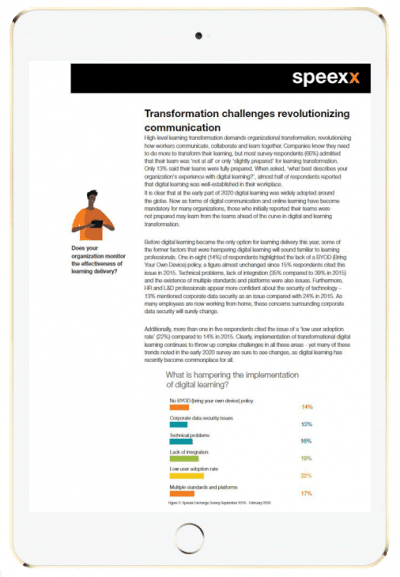Whitepaper
Delivering Effective Skills Development
How HR and L&D are preparing to meet the global talent challenge

Whitepaper | Delivering Effective Skills Development
Find out more about delivering effective skills development
In this whitepaper

You might also be interested in
How HR and L&D view the war for talent
HR and L&D professionals responding to Speexx’ annual survey carried out in late 2019 and early 2020 said their primary challenges for 2020 were engaging younger generations and finding and retaining the best talent. Looking back at 2015, 28% of respondents said they were prioritizing issues around finding and retaining the best talent – that number has since risen to 40%.
Transforming digital learning to deliver soft skills acquisition will be key to business success in 2020. Evolving digital learning platforms to enable employees to develop their soft skills as needed during the working day will give workers a real stake in their own development. Hard-to-retain younger employees will be able to acquire the collaboration and communication skills they need to work effectively in international teams. Additionally, giving employees the opportunity to develop foreign language skills that will allow them to navigate successfully in global business settings, helps the business as well. An engaged and enthusiastic workforce where employees feel their employer will support them as they develop their career will help improve employer branding, providing a solid pipeline of talent to support business operations and aspirations.
Using soft skills to meet business needs
Increasingly, it is becoming evident that soft skills development is the key to meeting business needs and building a pipeline of top-notch talent and future leaders. Soft skills such as language and communications skills are business-critical to success in the global marketplace – especially in times where teams, clients or business partners are unable to meet face-to-face and daily communication or meetings must be carried out virtually. Yet 81% of employees now believe that upskilling is their own personal problem. They don’t trust employers to help them.
How to deliver effective skills development
Companies are still widely delivering learning that is focused on job-specific hard skills or compliance. While hard skills are important, soft skills are increasingly providing a competitive edge. Soft (or behavioral) skills range from collaboration skills that are vital for virtual teams with members dispersed across the globe, through to negotiation skills that help win and retain partners and customers. Underpinning high-level soft skills are language and communication skills. Employees who are skilled in speaking foreign languages must also be able to communicate well across cultural divides, with a good understanding of business norms of behavior, for example.
Transformation challenges revolutionizing communication
High-level learning transformation demands organizational transformation; revolutionizing how workers communicate, collaborate and learn together. Companies know they need to do more to transform their learning, but most survey respondents (66%) admitted that their team was ‘not at all’ or only ‘slightly prepared’ for learning transformation. Only 13% said their teams were fully prepared. When asked, ‘what best describes your organization’s experience with digital learning?’, almost half of the respondents reported that digital learning was well-established in their workplace.

